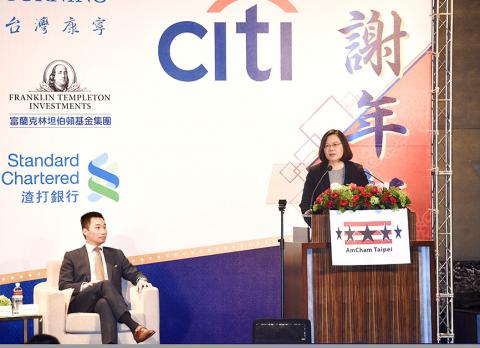The nation’s democracy and resulting development are an example for the Indo-Pacific region, a visiting US Department of State official said yesterday as he reiterated Washington’s commitment to supporting Taiwan’s international participation and helping it defend its democracy.
Alex Wong (黃之瀚), deputy assistant secretary at the department’s Bureau of East Asian and Pacific Affairs, made the remarks in a speech at the 50th annual Hsieh Nien Fan (謝年飯) banquet hosted by the American Chamber of Commerce (AmCham) in Taipei.
It was the only public appearance Wong is expected to make during his three-day visit, the first by a US official since Washington on Friday last week enacted the Taiwan Travel Act, which encourages high-level visits by Taiwanese and US officials.

Photo: Peter Lo, Taipei Times
However, the American Institute in Taiwan has denied a link between Wong’s visit and the new legislation, a stance echoed last night by AmCham Taipei chairman Albert Chang (章錦華), who said that they were classmates at Harvard Law School and that he agreed to visit months ago.
“Tonight should be about looking forward. Yes, we have done much to deepen US-Taiwan relations, but my message tonight is this: Let’s do more,” Wong said.
Taiwan’s constitutional democracy is an example for the entire Indo-Pacific region, because dynamic, broad-based and sustainable economic growth can only arise in the stable and certain conditions created under a constitutional government, Wong said.
“For that example to have the most force, for that example to do the most good, Taiwan can no longer be excluded unjustly from international fora,” Wong said.
Denying Taiwan the chance to share its experiences in public health, humanitarian relief and sustainable development would be unjust for anyone who could benefit from them, Wong said, pledging continued joint efforts between the US government and private sector to ensure that “Taiwan’s stellar international example shines brightly.”
Wong also lauded Taiwan’s efforts to forge close economic ties with nations throughout the Indo-Pacific region via the New Southbound Policy, which he said is vital to consolidating the free and open rules-based order in the region.
“The final thing I am certain of is the US’ support for Taiwan,” Wong said, adding that Washington would continue to bolster Taiwan’s ability to defend its democracy and ensure that its people can travel on their chosen path free from coercion.
In her opening remarks, President Tsai Ing-wen (蔡英文) had a light-hearted exchange with Wong, when she jokingly said she was “allergic” to Harvard Law School because she was not admitted.
Tsai then expressed her gratitude to US President Donald Trump’s administration and the US Congress for supporting the act.
“We also welcome deputy assistant secretary Wong as the latest to be here following visits by senior US officials at the state department, department of commerce, small business administrations and more,” she said.

A Ministry of Foreign Affairs official yesterday said that a delegation that visited China for an APEC meeting did not receive any kind of treatment that downgraded Taiwan’s sovereignty. Department of International Organizations Director-General Jonathan Sun (孫儉元) said that he and a group of ministry officials visited Shenzhen, China, to attend the APEC Informal Senior Officials’ Meeting last month. The trip went “smoothly and safely” for all Taiwanese delegates, as the Chinese side arranged the trip in accordance with long-standing practices, Sun said at the ministry’s weekly briefing. The Taiwanese group did not encounter any political suppression, he said. Sun made the remarks when

The Taiwanese passport ranked 33rd in a global listing of passports by convenience this month, rising three places from last month’s ranking, but matching its position in January last year. The Henley Passport Index, an international ranking of passports by the number of designations its holder can travel to without a visa, showed that the Taiwan passport enables holders to travel to 139 countries and territories without a visa. Singapore’s passport was ranked the most powerful with visa-free access to 192 destinations out of 227, according to the index published on Tuesday by UK-based migration investment consultancy firm Henley and Partners. Japan’s and

BROAD AGREEMENT: The two are nearing a trade deal to reduce Taiwan’s tariff to 15% and a commitment for TSMC to build five more fabs, a ‘New York Times’ report said Taiwan and the US have reached a broad consensus on a trade deal, the Executive Yuan’s Office of Trade Negotiations said yesterday, after a report said that Washington is set to reduce Taiwan’s tariff rate to 15 percent. The New York Times on Monday reported that the two nations are nearing a trade deal to reduce Taiwan’s tariff rate to 15 percent and commit Taiwan Semiconductor Manufacturing Co (TSMC, 台積電) to building at least five more facilities in the US. “The agreement, which has been under negotiation for months, is being legally scrubbed and could be announced this month,” the paper said,

Japan and the Philippines yesterday signed a defense pact that would allow the tax-free provision of ammunition, fuel, food and other necessities when their forces stage joint training to boost deterrence against China’s growing aggression in the region and to bolster their preparation for natural disasters. Japan has faced increasing political, trade and security tensions with China, which was angered by Japanese Prime Minister Sanae Takaichi’s remark that a Chinese attack on Taiwan would be a survival-threatening situation for Japan, triggering a military response. Japan and the Philippines have also had separate territorial conflicts with Beijing in the East and South China